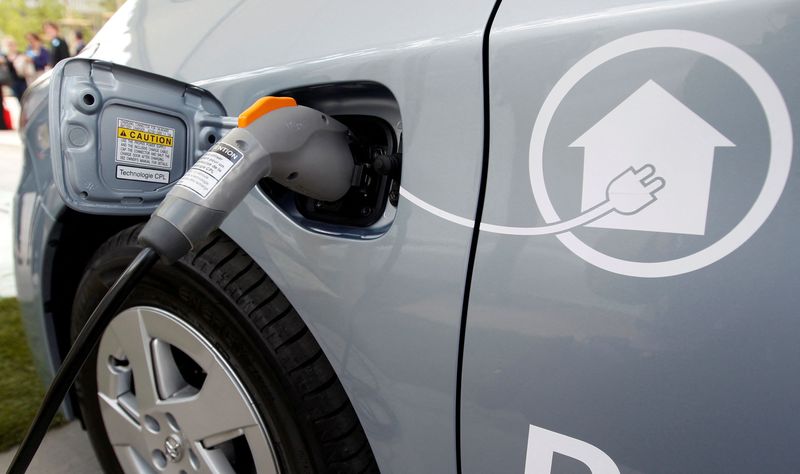By Victoria Waldersee
BERLIN (Reuters) - The European Union plans to toughen its method for measuring carbon dioxide emissions from plug-in hybrid cars, two sources familiar with the matter said, after criticism that current tests yield results up to four times below real-world emissions.
The new methodology could mean some carmakers, who in 2021 sold almost as many plug-in hybrids in Europe as they did battery-electric vehicles (BEVs), would need to sell more BEVs in order to meet EU emissions targets and avoid sizeable fines.
The revised test is likely to be enforced from around 2025, the sources said.
Data from fuel consumption meters - which under EU law must be built into new cars from 2021 - will be incorporated into the test, they said. This will show a more realistic picture of how much hybrid cars still rely on their internal combustion engine over the electric battery.
"The utility factor will be changed," Petr Dolejsi, sustainable transport director of the European Automobile Manafacturers' Association (ACEA) told Reuters, referring to the average estimate of how far a hybrid drives in electric mode.
"We are starting to collect the data from the vehicles...it is an ongoing process."
A European Commission official said an amendment to its Euro 6 pollutant emission implementing rules revising the testing approach - called the Worldwide Light Vehicles Testing Procedure (WLTP) - to determine utility factors based on real-life data from fuel consumption meters was under discussion, but they were not in a position to give further details.
The amendment would next be discussed by the Motor Vehicle Working Group, consisting of stakeholders from industry, the government and consumer associations, on Feb. 9, the official said, with a decision expected this year.
Changing the test to better reflect real-world emissions backs the growing consensus among environmental groups and regulators that plug-in hybrids are not as green as once thought, and should not be treated equally to battery-electric vehicles when designing policy to encourage electrification.
REALITY VERSUS THEORY
Carmakers, still recovering their image after the 2015 Dieselgate scandal in which some used illegal software to cheat emissions tests, often release the results of their emissions tests at the start of the year. The official figures are not published by the European Commission until later.
Volkswagen (DE:VOWG_p), Mercedes-Benz, BMW and Renault (PA:RENA) have said that they met their 2021 targets, bolstered by record electric vehicle sales.
Under the WLTP test implemented last year, carmakers pay inspectors to oversee them run a standardised test for all their vehicle types - from internal combustion engine to hybrid to battery-electric. This is done in their labs to come up with a figure for average carbon dioxide emissions per kilometre.
Targets for 2021 were around 95g CO2/km, varying slightly as each carmaker's target is adjusted dependent on the average weight of their vehicles.
The WLTP testing process was designed based on actual data about how and where people tend to drive, from the distance and speed to road type - a significant improvement to the previous test which was based exclusively on theoretical models.
But studies by environmental think-tanks such as the International Council for Clean Transportation (ICCT) show that even the WLTP test is far from reality, particularly for hybrid cars, which rely on the combustion engine about twice as much as test results show.
The ICCT studies used actual emissions data from over 100,000 plug-in hybrids from sources like company car databases or consumer fuel-tracking websites.
Reasons for the ICCT outcome include the fact that plug-in hybrids are charged less often and have a shorter all-electric range than the test assumes. The real-world deviation is even higher for company cars, likely because drivers have less of an incentive to charge the vehicle - a cheaper option than refuelling - if they are not themselves paying the price.
While the EU had voted to make it mandatory for carmakers to build fuel consumption meters into their cars from 2021, it was not yet clear whether this data would be incorporated into the emissions tests.

"Emissions have still been falling every year, and that's a real success," Peter Mock, Europe managing director of the ICCT, said. "But the big problem is the hybrids - that's what's deceptive."
(This story has been refiled to fix typo in paragraph 18)